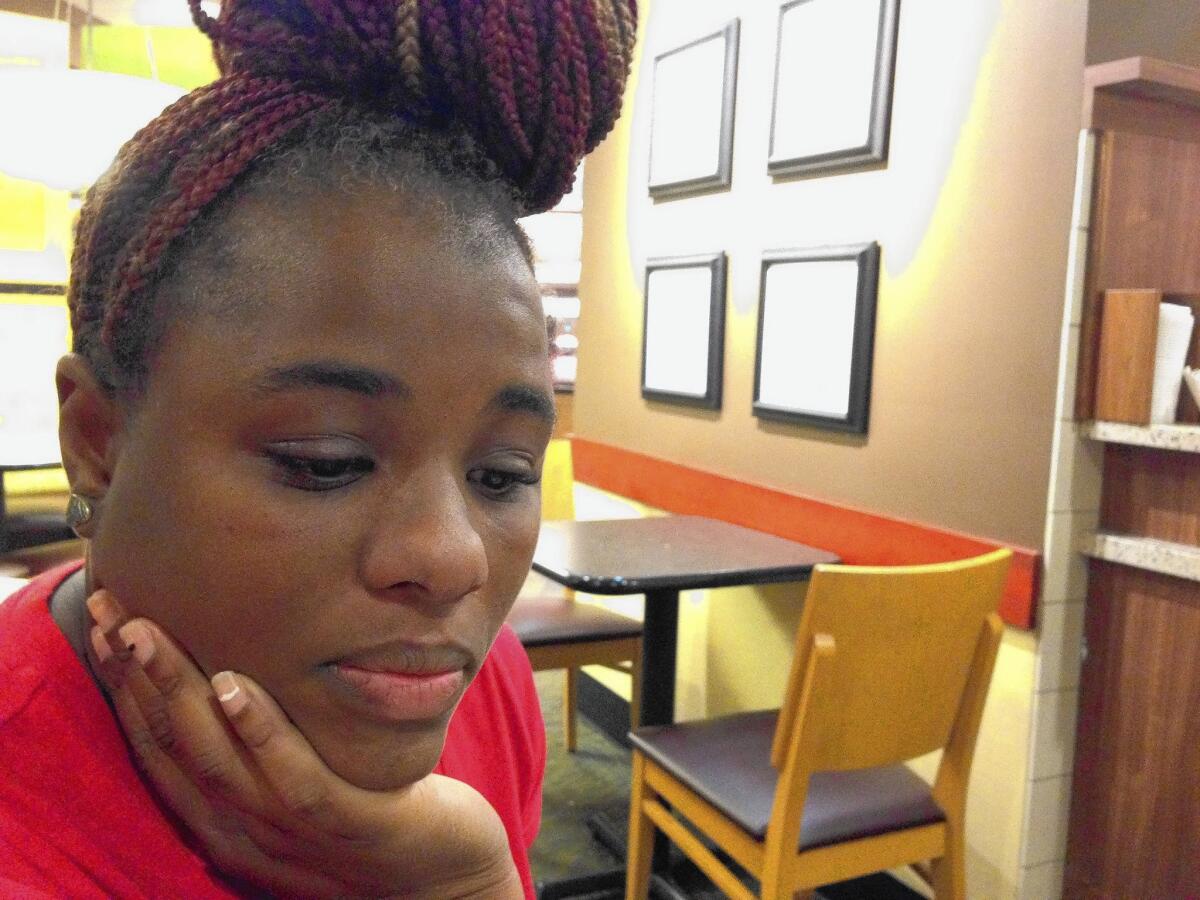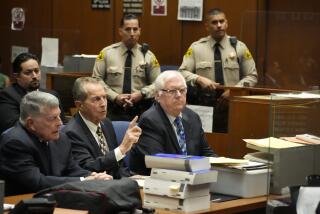Ferguson case reopens lingering wounds from previous police shootings

Tyrus Murray was 13 years old when her father, Earl Murray, and his friend Ronald Beasley died in a hail of gunfire during a drug bust gone awry.
Both men were black, and neither was armed. Their shooters were white law enforcement officers, and neither was indicted.
That was 14 years ago, but the case and others like it help explain the anger in this St. Louis suburb, where a white police officer’s shooting of an unarmed black man this month fueled angry protests and demands that the officer, Darren Wilson, be charged in the death of Michael Brown, 18.
One other thread of similarity: The chief prosecutor then was Robert McCulloch, the same chief prosecutor now handling the Michael Brown case.
“This really kind of opened the wounds,” said Earl Murray’s widow, Virgieann Murray, who was left to raise four daughters and a stepson when her husband was shot dead in Berkeley, Mo., about two miles from Ferguson. “He made some bad choices,” she said of Earl Murray, who according to court records had two felony drug convictions and a conviction for being a felon in possession of a firearm. “But he cared about his family,” she said. “He cared about me.”
Tyrus, now 27, remembers how she learned what happened to her father and Beasley on the afternoon of June 12, 2000. The television news began reporting a shooting at a fast-food restaurant near their home in Florissant, a St. Louis suburb. Her mother was at work. Amid a flurry of phone calls, the family learned the horrible truth that still follows them.
“Whatever his record, nobody should be judge, jury and executioner,” said Tyrus Murray, who still gets asked about her father’s death, which prompted widespread protests and a federal investigation. She teared up while describing the lingering impact it has had on her: fear of police, cynicism toward the justice system, and weariness of hearing about cases like Brown’s.
When she learned of Brown’s shooting on Aug. 9, Tyrus Murray said the first thing that crossed her mind was, “There goes another one.”
Neither Tyrus nor her mother, both of them school bus drivers, took part in the protests in neighboring Ferguson, where Brown died, or outside the office of McCulloch, the St. Louis County prosecutor, in nearby Clayton.
McCulloch began presenting evidence last Wednesday to a grand jury. It will decide whether there is enough evidence to file charges against Wilson, who fired six shots into Brown. Police say he fired in self-defense after Brown attacked him. Brown family attorneys and some witnesses say Wilson attacked Brown and shot him as Brown tried to surrender.
Protesters say that too often, McCulloch has failed to prosecute law enforcement officers in cases involving shootings of unarmed African Americans. The case they cite most often is the one involving Murray and Beasley.
McCulloch, an elected official who has been returned to office by voters repeatedly since becoming county prosecutor in 1991, denies bias and bristles at allegations that his own family’s tragic history has clouded his judgment. McColloch’s father, Paul McCulloch, was a St. Louis police officer who was shot to death on duty in 1964, when McCulloch was 12 years old. The assailant was black.
“I know the pain that goes with the loss of a loved one to violence,” McCulloch said in an interview last week with St. Louis’ KSDK television. “I know the pain the Brown family is going through right now.”
McCulloch said his father’s loss had affected how he does his job, but in a positive way. “What it did to me was made me, I think, a fierce advocate for victims of violence,” he said.
His critics disagree.
Rufus J. Tate Jr., a former president of the Mound City Bar Assn. of African American lawyers, said McCulloch would try to bury the grand jury with evidence and witnesses to muddle their view of what happened and plant doubt in their minds, making an indictment unlikely.
“This has nothing to do with whether 12 people can make a determination,” Tate said. “This has everything to do with the way they’re being fed information.”
In the Murray/Beasley case, the grand jury — whose proceedings were not public — heard about 40 hours of testimony, including from the shooters: a U.S. drug agent and a police detective who fired 21 shots at Murray and Beasley. Beasley, a friend of Murray’s, was not wanted for a crime but was a passenger in Murray’s car that afternoon.
The St. Louis Post-Dispatch, which reviewed the grand jury transcripts, reported that of 13 law enforcement officers involved in the planned drug bust, three said Murray’s car was moving toward the officers when they opened fire. Those three included the shooters.
Four law enforcement officers said the car was not moving forward, the Post-Dispatch reported, quoting the grand jury transcripts.
The grand jury voted not to indict.
A separate federal investigation concluded that Murray’s car was reversing in an attempt to escape the officers and that the officers fired “out of fear and panic.” The U.S. attorney for the Eastern District of Missouri at the time, Raymond Gruender, called the shootings “troubling” but said there was not enough evidence to pursue federal charges of civil rights violations.
McCulloch rejected calls to reopen the investigation, saying that what was most important was that the officers believed their lives were in danger.
“These guys were bums,” McCulloch said the year after the shootings, alleging that Murray was desperate to flee police because he faced a lengthy prison term if convicted a third time on drug charges.
Tyrus and Virgieann Murray still seethe at the memory of that comment.
“How can we expect any justice when he’s calling these people bums?” said Earl’s widow, a youthful-looking 50-year-old with boyishly short hair, a rose tattoo on her wrist, and meticulously manicured fingernails.
Virgieann Murray’s anger becomes clear as she talks about the case. More than anger, though, a sense of confusion comes through as she asks repeatedly how two unarmed men could be shot to death without any compensation for their families. A judge in 2005 dismissed a lawsuit filed by the families alleging the men’s civil rights had been violated.
At the very least, Murray said, the families should have been offered counseling to alleviate the anger they still carry.
“We walk around like we’re OK, but this has really torn us up,” she said. “You know something is unjust and nothing is done about it — it’s hard.”
Neither Tyrus nor Virgieann support the looting that erupted in Ferguson in the days after Brown’s death, but they understand why it happened.
“It’s not just from the most recent case. It’s from all the previous situations,” Tyrus said. “People are tired. Just tired.”
“He was the last straw,” her mother said of Brown.
Maybe if people had risen up more back in 2000, after Murray and Beasley died, things would have changed, she added.
“Maybe we should have started acting crazy,” said Virgieann Murray. “I’m glad they’re doing it now. I hope they get justice.”
Twitter: @tina susman
More to Read
Sign up for Essential California
The most important California stories and recommendations in your inbox every morning.
You may occasionally receive promotional content from the Los Angeles Times.










